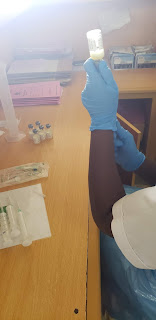And that's a wrap on the 2019 Uganda APPE! Everyone made it back safely to the U.S. and students have already settled into their next rotations. This was my third offering of this APPE. Every year I've learned so much. Since it's a research elective, I have a lot of flexibility in how I implement the rotation. Therefore I've been given the room to try some creative projects.
 |
| With Winnie Nambatya, one of the fantastic Ugandan preceptors we worked with this month. Front: An and Melanie M Back: Joe, Melanie N, Winnie |
1) Is there a role for pharmacogenomics in Sub-Saharan Africa to improve patient care.
2) With the rollout of dolutegravir in Uganda, what is known about incidence of dolutegravir-related IRIS
3) As availability of flucytosine in Uganda may increase in future, is there a role for therapeutic drug monitoring of antifungals in resource-limited settings.
Students were asked to do a literature review on their topic. Based on what they found in the literature, coupled with observations from their experiences in different settings throughout their rotations, they were to design a research study to address the research question they were assigned. In addition to sharing their results in a presentation at the end of the rotation, they were asked to prepare a specific aims statement.
I didn't know how well this was going to work but the students hit this assignment out of the park. All three of them proposed studies that I think have potential to be implemented. In pharmacy school, students learn how to critique research studies. But how to identify a research problem, and then design a study to address that research problem requires an entire different level of thinking that most people (including myself) don't develop until years of training in graduate and post-graduate programs. Likewise,writing specific aims page can be a daunting task. They are only one page in length but they require precise writing and an impeccable flow of logic- they are intended to convince a grant reviewer or funder that your study adequately addresses a significant problem. Writing a compelling specific aims page is an invaluable skill as a researcher. In short, feedback from the students suggests that both myself and the students got a lot out of it. The students shared that the project forced them to think in a way that they weren't used to thinking. Mission Accomplished!
So now I turn my thought to next year of the APPE. Since Prosperity has graduated and I will no longer have her help in precepting this rotation, I have been thinking a lot about timing and capacity. Over the next few months, I'll be thinking a lot about: What is optimal timing of the rotation; What is the optimal number of students? What is the right balance between clinical and research activities? How can I better integrate research projects into the rotation?
In other news, my career is approaching a significant milestone. Just last week I submitted (what I hope is) the final draft of my dossier for promotion and tenure. Over the next year, various levels (External Peers, Department, College, Provost, Board of Regents) will be reviewing this package to determine whether I meet the requirements for tenure at my University. Preparing this dossier has taken a significant amount of energy and attention from me, not only in putting the document together, but moreso in ensuring that I had the publications, grants, and evidence of quality teaching and service to include in the document. Needless to say, I am very much looking forward to an upcoming weeklong vacation I will be spending with my family in Ohio.
While preparing the dossier, I spent a lot of time reflecting on my past contributions. The entire point of the dossier is to explain your scholarship and why it's important. This summer, my goal is to re-shift my focus to be forward-thinking again. Although there are lots of data to collect and papers to write from our current projects, I've already started planning my next grant applications. It's exciting and exhausting to get back into grant writing!
While this summer/fall there are grants I am working on (an internal grant, an R03, and a co-I on a P01), I have also started planning for my first R01! For those of you not in research/academia, R01s are the quintessential backbone of NIH research funding. I'm not exaggerating when I say it will take me 6 months - 1 year to write this. My task for this fall is to nail down my specific aims (see above). I've been reflecting recently about how my different lines of research may fit together into one grant application. How can I leverage my partnerships in Uganda? What new collaborations should I be pursuing? What preliminary data do I still need to obtain to make this application competitive. I don't know these answers, but I'm excited to dig in this summer. More later!
 |
| Uganda has a lot going for it...but I miss this face when I'm away.. Happy Adoption Anniversary Sadie! |


































